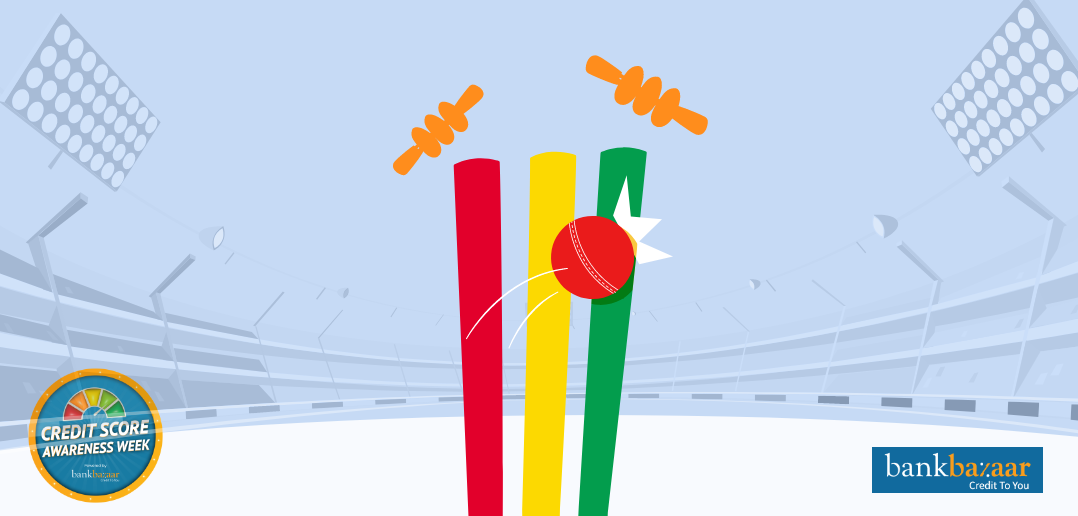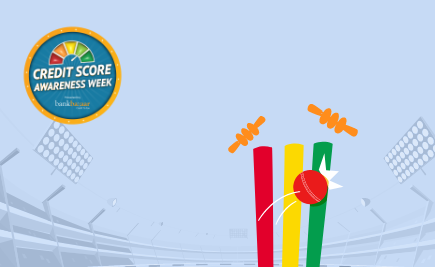Drawing wisdom from real-life scenarios, whether you’re juggling ongoing loans or seeking the best interest rates, this blog aims to empower you in navigating the intricacies of your Credit Score to safeguard your financial well-being. Authored by AR Hemant, AVP, Communications for BankBazaar.com, this blog provides a unique perspective on financial management.

In The Bee, The Beetle and the Money Bug, we have a case study about a man named Syed who had a Credit Score of 844. Once, on his way to a foreign country, Syed purchased a book from an airport store with his Credit Card.
While he was abroad, the Credit Card bill was generated, and it was soon time to pay. Syed, still abroad, couldn’t access the payment gateway on the due date due to technical reasons. So, he missed the payment. This had serious consequences.
Even though it was a small payment of ₹250, the Credit Score damage was large. His score fell to 776 in the first month. Once Syed returned to India, he paid his dues along with a late payment fee of ₹300 + interest and GST. Despite the full payment, his score fell another 49 points to 727 in the second month.
But that wasn’t all. Syed was in the market for a Home Loan at the same time. Since his Credit Score had declined sharply, he was no longer eligible for the best interest rates in the market. With his score at 844, he’d have received an offer of 8.60%. But at 727, the best he got was 9.30%.
Since he was borrowing ₹50 lakh, the interest difference on the loan at a higher rate was ₹5.40 lakh over 20 years. That, in essence, was the real damage for missing a single Credit Card payment of just ₹250.
With interest rates and loan offers tightly linked to your Credit Score, it’s important to know your score and keep it at healthy levels. With Syed’s cautionary tale in mind, here’s what I practice.
Despite my payments being 100% on time for the last many years, my score keeps fluctuating. I may suddenly lose 20 points and it could take months to recover. This happens partly due to my Credit Card use and partly due to the impact of an ongoing Home Loan. My aim is to stay above 800. I track my score through the free checks on BankBazaar. Checking your score once a month is enough. I feel it’s very important if you have ongoing loans and Credit Cards. The point also needs to be made that self-checks—also called ‘soft’ checks—do not harm your score in any way.
It’s very simple. If your EMIs and card payments are on time, your score will improve. It will be over 800, and that’s where you need to be to get the best loan and Credit Card offers. Anyone who tends to be late and forgetful can simply automate their payments via their banks. If you’re late, start tracking your score every month, and take corrective actions through timely payments in the coming months.
Additional Reading: Unlocking Credit: How to Boost Your Approval Chances for Credit Cards
This is the easiest way to build your Credit Score. Even small transactions backed with full and timely repayment will get you into the super-prime borrower category in no time. That, in turn, will help you when you need to take a loan. New-to-credit customers often have to pay a higher interest rate on their loans. But with your healthy money habits and high score demonstrated with your responsible Credit Card usage, you will get preferential rates.
You may have a large spending limit on your Credit Card. But if you’re hitting your limits frequently, your credit utilisation goes up—and your score comes down. If I have a month with high spends, I actively pay down my card balance through the month. So, when the bill generates at the end of the month, I’ll not be looking at a large bill—and a potential score damage.
Additional Reading: How To Maintain A Low Credit Utilisation Ratio
I once had an NBFC check my Credit Score during a loan refinance. This was a ‘hard’ check. It lowered my score by 9 points and took me under 800, thus denying me the lowest rate on offer. While my score recovered, the lesson I learnt is that too many Credit Card or loan applications in a short span of time can lead to several hard checks that can damage your score significantly. So, apply for your cards and loans after carefully assessing what you really need to borrow.
Additional Reading: What’s A Good Credit Score For Easy Loan Approval?
In the last few years, we’ve seen growing awareness around Credit Scores and how they impact your life and finances. One great example that emerged recently is how your score can be damaged by fraud. You may have paid all your EMIs on time, or you may have never even taken a loan in your life. But if your PAN has been linked to a defaulter, your own score will be damaged. One way to track fraud is to check your credit report regularly. Even if you don’t have ongoing credit lines, downloading a free report once a year can help you stay on top of your credit health. If someone has fraudulently used your credentials to open a loan, you can escalate the matter with the lender.
In summary, borrow thoughtfully, always pay your dues on time, go easy on the spending limit, and check your Credit Score once a month. Good credit health equals good financial health.
Copyright reserved © 2024 A & A Dukaan Financial Services Pvt. Ltd. All rights reserved.


